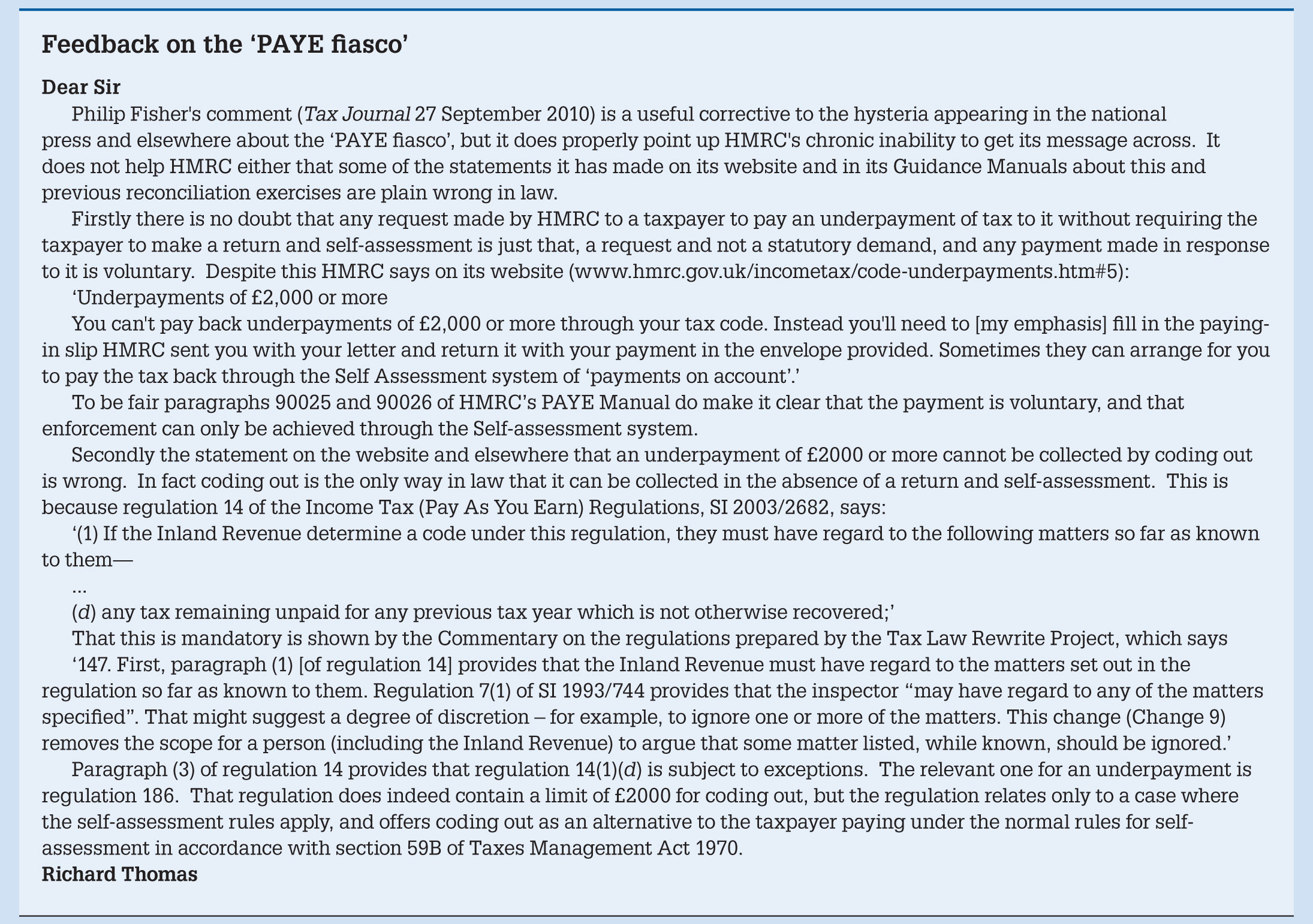Ken Almand on HMRC’s new Statements of Practice on transfer pricing procedures
Sleeping at night can be a problem for tax executives of multinational businesses that have transfer pricing issues.
Typically they are tasked with achieving certainty as to potential tax exposures whilst avoiding the expensive trap of double taxation.
This task is made more difficult because establishing transfer prices often involves making subjective judgments and even HMRC’s guidance describes it as an ‘art not a science’.
Fortunately help is at hand in the form of Advance Pricing Agreements (APAs), the Mutual Agreement Procedure (MAP) and EU Arbitration Convention.
These can provide a means of achieving relative certainty and mitigating the risk of double taxation. It is therefore welcome news that HMRC is issuing Statements of Practice (SPs) covering these procedures.
The result should be greater clarity as to HMRC’s practical policies which in turn should enable businesses to make more effective use of these opportunities.
The SP documents were publicly launched at an HMRC event in early September with further details to be posted on the HMRC website.
Changes to APAs
APAs are generally most useful for complex transfer pricing issues where significant amounts of tax are at stake. HMRC is publishing the SP in order to clarify their approach and to incorporate best practice into the guidance.
The result is more HMRC’s interpretation of the relevant legislation rather than a significantly change to its policy. The SP adopts a practical approach which is enhanced by the use of examples and helpfully sets out the information to be included in a formal application, a sample APA agreement and a typical bilateral agreement timeline.
The document also encourages the use of the ‘expression of interest’ process when a business is considering making an application.
It is encouraging to see that this policy is to continue as it offers businesses a valuable opportunity to discuss the merits of making a formal application with HMRC before putting pen to paper.
So does the SP address some of the grumbles emanating from business in the past about the APA process? These include the procedure taking too long, uncertainty as to HMRC’s interpretation of the complexity threshold and a lack of encouragement for unilateral APAs.
The first of these would seem to require a collective commitment across jurisdictions to speed the process up and is thus outside of the scope of the SP.
As regards the second, readers may feel that more detail or examples regarding the complexity threshold would be helpful.
As for unilateral APAs, the SP reiterates HMRC’s general recommendation that most applications should be bilateral rather than unilateral and therefore it appears that there has been no change of policy in that regard.
Changes to MAP
The MAP process provided for in Double Tax Agreements seeks to prevent double taxation.
The SP is being produced in response to ongoing developments in OECD thinking, domestic legislative changes and EU Arbitration processes.
Of particular note is that the new Article 7 of the OECD Model Convention may provide corresponding adjustment opportunities for multinationals in relation to permanent establishments.
HMRC’s current practice is set out in Tax Bulletins 25 and 31 and in the International Manual. It is understood that these will be superseded by the SP.
There are a number of changes proposed by HMRC, many in response to representations by frequent users of MAP.
Some of the more noteworthy ones are: guidance as to when the procedure is appropriate, discussion as to the interaction of MAP and the Arbitration Convention in practice, confirmation of time limits for submitting cases and details on how relief is provided.
There is useful guidance on when in the enquiry process a claim should be considered and clarification that the UK may give unilateral relief where a treaty partner does not consider thin capitalisation to qualify for entry into the process. Overall the draft SP adopts a practical approach including examples and is effective in clarifying issues that were previously ambiguous.
It should be noted that the public consultation remains open and therefore there is an opportunity to make representations.

A welcome clarification
Over the years the UK has earned a positive reputation for the manner in which it administers both APA and MAP. The SPs provide a welcome clarification of HMRC policy and practical aspects of the application processes.
Arguably the MAP SP contains a greater number of significant policy clarifications, which is not surprising given the focus on arbitration policies by the EU and OECD since the HMRC guidelines were last revised.
Multinational businesses with transfer pricing issues should review the SPs to see if they may provide opportunities to use APAs or MAP to increase certainty with regards to their transfer pricing exposures and help their tax executives rest a little easier at night.
For details from HMRC on the current consultation, including who to contact to obtain copies of the draft SPs, visit www.lexisurl.com/BIdyl.

Ken Almand, Head of Transfer Pricing, Mazars
Ken Almand on HMRC’s new Statements of Practice on transfer pricing procedures
Sleeping at night can be a problem for tax executives of multinational businesses that have transfer pricing issues.
Typically they are tasked with achieving certainty as to potential tax exposures whilst avoiding the expensive trap of double taxation.
This task is made more difficult because establishing transfer prices often involves making subjective judgments and even HMRC’s guidance describes it as an ‘art not a science’.
Fortunately help is at hand in the form of Advance Pricing Agreements (APAs), the Mutual Agreement Procedure (MAP) and EU Arbitration Convention.
These can provide a means of achieving relative certainty and mitigating the risk of double taxation. It is therefore welcome news that HMRC is issuing Statements of Practice (SPs) covering these procedures.
The result should be greater clarity as to HMRC’s practical policies which in turn should enable businesses to make more effective use of these opportunities.
The SP documents were publicly launched at an HMRC event in early September with further details to be posted on the HMRC website.
Changes to APAs
APAs are generally most useful for complex transfer pricing issues where significant amounts of tax are at stake. HMRC is publishing the SP in order to clarify their approach and to incorporate best practice into the guidance.
The result is more HMRC’s interpretation of the relevant legislation rather than a significantly change to its policy. The SP adopts a practical approach which is enhanced by the use of examples and helpfully sets out the information to be included in a formal application, a sample APA agreement and a typical bilateral agreement timeline.
The document also encourages the use of the ‘expression of interest’ process when a business is considering making an application.
It is encouraging to see that this policy is to continue as it offers businesses a valuable opportunity to discuss the merits of making a formal application with HMRC before putting pen to paper.
So does the SP address some of the grumbles emanating from business in the past about the APA process? These include the procedure taking too long, uncertainty as to HMRC’s interpretation of the complexity threshold and a lack of encouragement for unilateral APAs.
The first of these would seem to require a collective commitment across jurisdictions to speed the process up and is thus outside of the scope of the SP.
As regards the second, readers may feel that more detail or examples regarding the complexity threshold would be helpful.
As for unilateral APAs, the SP reiterates HMRC’s general recommendation that most applications should be bilateral rather than unilateral and therefore it appears that there has been no change of policy in that regard.
Changes to MAP
The MAP process provided for in Double Tax Agreements seeks to prevent double taxation.
The SP is being produced in response to ongoing developments in OECD thinking, domestic legislative changes and EU Arbitration processes.
Of particular note is that the new Article 7 of the OECD Model Convention may provide corresponding adjustment opportunities for multinationals in relation to permanent establishments.
HMRC’s current practice is set out in Tax Bulletins 25 and 31 and in the International Manual. It is understood that these will be superseded by the SP.
There are a number of changes proposed by HMRC, many in response to representations by frequent users of MAP.
Some of the more noteworthy ones are: guidance as to when the procedure is appropriate, discussion as to the interaction of MAP and the Arbitration Convention in practice, confirmation of time limits for submitting cases and details on how relief is provided.
There is useful guidance on when in the enquiry process a claim should be considered and clarification that the UK may give unilateral relief where a treaty partner does not consider thin capitalisation to qualify for entry into the process. Overall the draft SP adopts a practical approach including examples and is effective in clarifying issues that were previously ambiguous.
It should be noted that the public consultation remains open and therefore there is an opportunity to make representations.

A welcome clarification
Over the years the UK has earned a positive reputation for the manner in which it administers both APA and MAP. The SPs provide a welcome clarification of HMRC policy and practical aspects of the application processes.
Arguably the MAP SP contains a greater number of significant policy clarifications, which is not surprising given the focus on arbitration policies by the EU and OECD since the HMRC guidelines were last revised.
Multinational businesses with transfer pricing issues should review the SPs to see if they may provide opportunities to use APAs or MAP to increase certainty with regards to their transfer pricing exposures and help their tax executives rest a little easier at night.
For details from HMRC on the current consultation, including who to contact to obtain copies of the draft SPs, visit www.lexisurl.com/BIdyl.

Ken Almand, Head of Transfer Pricing, Mazars







